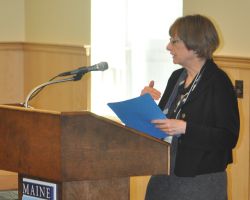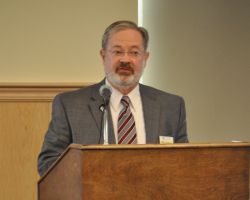

| Home | Hours | FAQ | Services | My Account | Borrowing | Contact | Site Map |
|
|
|

| Home | About the Collection | About William S. Cohen | Events & Outreach | Special Collections Department |
 Greetings, I am Joyce Rumery, Dean of University Libraries at the
University of Maine. Welcome to the fourth William S. Cohen Papers
Forum, The Promise and Problems of Transparency. As with the
previous forums this topic came from Secretary Cohen’s papers and
today we will have an opportunity to explore what is meant by the
word “transparency,” and what it means for the balance between
openness and privacy.
Greetings, I am Joyce Rumery, Dean of University Libraries at the
University of Maine. Welcome to the fourth William S. Cohen Papers
Forum, The Promise and Problems of Transparency. As with the
previous forums this topic came from Secretary Cohen’s papers and
today we will have an opportunity to explore what is meant by the
word “transparency,” and what it means for the balance between
openness and privacy.
Within the world of libraries, Nancy Dowd, of the New Jersey State
Library, defined the term by saying, “transparency is all about
organizations listening, responding, and sharing the process. It’s
about letting strangers have an impact on how things are done.” We
see unprecedented levels of collaboration and interactivity in
library catalogs, databases, and through social networking sites.
This day will be a chance for us to see how these changes are being
taken up in other fields as well…
[Recognition of sponsors, staff members, and explanation of
logistics of the day omitted here.]
Now it is my pleasure to introduce my colleague, Michael M.
Hastings. A native of Morrill, Mike Hastings graduated from Bowdoin
College (ME) in 1972. Following a year of graduate study at George
Washington University (DC), he worked for twelve years as a
legislative assistant (foreign relations, national security and
maritime affairs) to Bill Cohen (1973-1980) and George Mitchell
(1980-1984). In 1984, Mike and his family moved to Africa where he
was a relief and development administrator for CRS, the overseas
development and relief agency of the U.S. Catholic Bishops. In 1992,
he returned to Maine to direct the Maine Aquaculture Innovation
Center, a non-profit “center for excellence” that promotes research
leading to economic development.
In 2004, he was hired by the University of Maine to be Director of
the Office of Research and Sponsored Programs. Staff members in his
unit assist UMaine faculty and professional staff apply to
government and foundations for research support. When awards are
received, staff works with faculty to insure that supported
activities are conducted in a responsible, efficient, ethical, and
professional manner. Mike also serves as an advisor to the
University’s School of Policy & International Affairs. Please join
me in welcoming Mike.
 Thank you. I’m Mike Hastings, Director of Sponsored Programs here at
the University of Maine. I’m delighted to join with the others in
welcoming you to this Cohen Papers Forum on the promise and problem
of transparency in government.
Thank you. I’m Mike Hastings, Director of Sponsored Programs here at
the University of Maine. I’m delighted to join with the others in
welcoming you to this Cohen Papers Forum on the promise and problem
of transparency in government.
I was asked by Desiree Butterfield-Nagy, Archivist of the Cohen
Papers, to make the introduction of our keynote speaker because she
knows that I am interested in ways to improve the quality of public
debate on national policy issues.
This interest dates back to the 93rd Congress, when I had the
privilege of working for Bill Cohen, then a 34-year-old,
newly-elected, freshman member of the US House of Representatives.
In the 93rd Congress, both the House and the Senate were controlled
by the Democratic Party. Consequently, it was difficult for a
freshman member of the minority party to accomplish much. It was
next to impossible for a freshman Republican to introduce
legislation of national importance, and to have that legislation
seriously considered by a standing committee. In 1973, Bill Cohen
did the impossible.
The year before, the Supreme Court of the United States decided a
case, Branzburg v. Hayes. In its decision, the Court held that the
first amendment did not give journalists a constitutional right to
withhold from grand juries two things: 1) confidential sources, and
2) news information received from those sources.
In response to the Court’s decision, Bill Cohen recommended that
Congress pass a law giving journalists the “privilege” of keeping
their sources confidential under certain defined circumstances.
He called his shield proposal the “Newsman’s Privilege Act.” He
immersed himself in the legal and public policy issues that were
involved, and he persuaded a large number of his colleagues to
cosponsor his proposal.
Cohen then approached, and convinced, Representative Robert
Kastenmeier of Wisconsin, the Chair of a House Judiciary
Subcommittee, to hold a series of in-depth hearings on a collection
of over 50 shield proposals, cosponsored by 143 House members. Those
hearings occurred in the spring of 1973.
On June 14, 1973 Kastenmeier’s Subcommittee voted to “report out” to
the full committee, Cohen’s bill, which established a two-tiered
statutory “privilege” for newsmen, designed to guaranty freedom of
the American press. Then began a five-year public policy debate over
whether Newsmen’s Privilege would be good or bad for the country.
Throughout these five years, Bill Cohen assembled coalitions of
like-minded Congress people, from both parties, who believed that
democracy works best when the people are informed. That debate that
occurred then was not unlike the debate now taking place over
President Obama’s “Open Government Initiative.”
Though other concerns --the resignation of Vice President Agnew, the
impeachment of Richard Nixon and America’s exit from Vietnam--
ultimately prevented the Cohen proposal from reaching the house
floor for a vote, it was clear to everyone in the House during the
93rd, 94th and 95th Congresses, that Bill Cohen had both the
intellect and the drive to achieve significant legislative
accomplishments.
It is fitting that this Cohen Papers Forum focuses our attention
today on how information gathered and generated by government should
be shared with the governed.
The Cohen Archives and the Cohen Center here at the University have
successfully identified an expert on the subjects of Transparency
and Open Government. He is Professor Cary Coglianese, the Deputy
Dean of Academic Affairs at the University of Pennsylvania Law
School, and the author of over one hundred peer-reviewed papers on a
wide range of subjects including: administrative law, policy-making,
corporate governance and electronic government.
Last year, Dr. Coglianese wrote last year in the journal GOVERNANCE
the following:
“Good, open government is not the same as a reality television show
that broadcasts every move officials make and every conversation
they have. On the contrary, good government actually requires
certain limits on this kind of fishbowl transparency. Moreover,
recognition of such limits holds implications for the political
strategy of open government reform, Reformers who trumpet
transparency at nearly every turn, or who suggest that transparency
can cure all that ails public policy, raise public expectations of a
much too extreme openness. As meeting such high expectations is
neither realistic nor wise, raising these expectations poses
political risks.”
If you wish to hear more, please join me in welcoming our keynote
speaker, Dr. Cary Coglianese.
[end of transcript.]
Return to the main Transparency Forum page
Contact Fogler Library Special Collections: 207.581.1686 | um.library.spc@maine.edu
| Fogler Library 5729 Fogler Library Orono, ME 04469-5729 |
 |
Tel: 207.581.1661 Fax: 207.581.1653 foglerlibrary.web@maine.edu |
| University of Maine | | Orono ME 04469 | | 207.581.1865 |
![]()